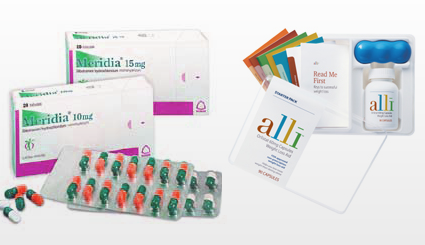Sarah Baumgard | Mon April 20, 2009
Very insightful, Anoop!
I didn’t know the difference between dietary drugs and supplements, thanks for answering my questions!

April 19 2009
Everyone seems to have questions like do weight loss drugs & supplements work, are they safe, and if so, how do they work. Here is the run down:
Before you understand if they work or not, you have to understand the difference between weight loss drugs and weight loss supplements :
Weight Loss Drugs: They can be either prescription or Over the counter drugs. These are approved by the Federal Drug Administration (FDA). That means, the safety & efficacy of these drugs are proven in clinical studies.

These drugs have shown 5-10% of weight loss (of initial body weight), around 2lb/month with lifestyle medications. Examples are Alli, & Meridia as shown in the picture.
Dietary Supplements: These are not approved by the FDA and hence are not tested in clinical trials. So the safety and efficacy carries a big question mark. Simply put, most don’t work and are not safe.
Suppressing Appetite: Most weight loss drugs work by suppressing the appetite and thereby reducing food intake.
An example is Meridia (sibutramine), which is the only drug approved by FDA for long-term use.
Altering food absorption: These reduce weight by preventing the absorption and digestion of fat in foods.
Alli (Orlistat) which prevents fat absorption is the only over- the-counter drug approved by the FDA to treat obesity .
Increasing Energy expenditure: These drugs (called thermogenics) help by increasing your metabolism or energy expenditure. You can expect 2-3% increase in your metabolism (around 100-150 calories/day).
Ephedrine works via the same mechanism and also by suppressing appetite. FDA hasn’t approved ephedrine as a weight loss drug. Mua Hung – a natural source of Ephedrine- can be found in many dietary supplements.
Sarah Baumgard | Mon April 20, 2009
Very insightful, Anoop!
I didn’t know the difference between dietary drugs and supplements, thanks for answering my questions!
Solid article in my opinion. It’s human nature to look for a miracle cure and while weight loss agents can help. They are just that, a supplement or “aid” for diet and exercise and certainly not a substitute for a healthy lifestyle. Thanks Anoop.
Anoop | Tue April 21, 2009
Thanks Sarah & Jim
I think most people think that weight loss drugs works via some magic mechanism so they can still eat all the food they are eating and lose weight if they are on it.
I should have made it clear. I just added that to the conclusion.
And you do have to fall in a certain category (> 30 BMI or > 27 BMI with heart and other obesity related problems) to be eligible for medication. So it’s not just anybody can go get it.
Obviously, there are side effects.But as long they are not serious and taken in the right doses, they are as safe as aspirin.Just to be sure I am talking about weight loss drugs and not the dietary supplments you saw in GNC and walmart.
Anoop | Mon May 11, 2009
It’s funny that I wrote this article and few weeks after FDA banned Hydroxycut. And Hydroxycut is one of the most popular drugs out there.
© 2008 - 2025 | Exercise Biology. All rights reserved.